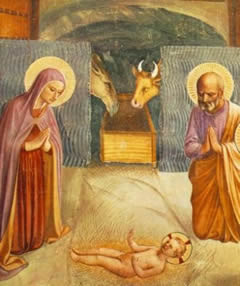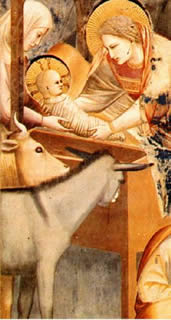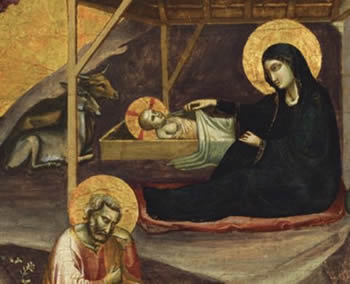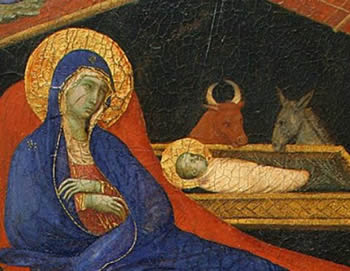By Kristin Geiser. Kristin earned her B.A. in Theater and her Ph.D. in Education from UCLA. She is a writer, teacher, and lay minister who works to foster caring, inclusive, and creative conversations about faith. She lives with her family in Northern California.
"Memory is an invitation to the source of our life, to a fuller participation in the now… We actually inhabit memory as a living threshold…a cross-roads where our future diverges according to how we interpret, or perhaps more accurately, how we live the story we have inherited." —David Whyte, Poet
At this time of year, the rhythm of my life changes as I enter into a season oriented around the inherited story of Jesus’ birth. It doesn’t take long to find my groove within this familiar rhythm. But then Whyte’s meditation on memory gently interrupts and beckons me to step out of my groove and into the cross-roads, to re-imagine my relationship with the story in a way that allows a different and fuller participation.
 |
|
Fresco of the Christ Child, c. 1300, by Fra Angelico.
|
This process of taking familiar elements of life and memory and inviting them to come together in new ways is creative work. It is also holy work. It reminds me of the Celtic notion of “thin” spaces where the veil between this world and the next world is lifted. Within that space of presence and discovery, it is said that one may receive a glimpse of God.
Perhaps the familiar rhythms of this season are meant to offer the comfort we need to step into a thin space where our lives enter into an unpredictable and invisible conversation with the inherited story of Jesus’ birth.
What does it mean to “inhabit memory as a living threshold?” What does this look like? What does this sound like?
I began looking and listening for answers to these questions. And then I remembered.
One of my favorite refrains in scripture is the way Jesus simultaneously honors and interrupts human longing and pondering with a gentle kick in the rear.
You want to be well? Then pick up your mat and walk.
You want to be healed? You are healed, now go and live well.
You have heard it said. Now go and love your neighbor.
As I pondered the beauty of David Whyte’s invitation, and began to despair over how far the public discourse around Christmas is from a “living threshold” narrative, I imagined how Jesus might speak into my desire and dissonance.
“You want a new narrative? Then pick up your pen and write.”
So, I picked up my pen. And I invited a few friends to join me. “Tell me,” I asked, “how do you inhabit this threshold?”
One writer described her relationships with her grandmother, her mother and her daughter as an example of what it means to live in the threshold or experience the creative tension between what has been and what is yet to be. She writes, "Maturity beckons us to hold the past and the present while welcoming the future. And to welcome the future we have to trust in the unknowable. What does it mean to not let ourselves be defined by our inherited story? To grow beyond it and not be cornered by it? My inherited story is both my strength and my hang-up."
 |
|
Fresco of the Christ Child,
c. 1300, by Giotto. |
Sometimes we get to choose when we grow beyond our inherited story, and at other times circumstances require us to do so. One friend wrote, "Newly married and in a new home, the holidays again bring a shakiness and a hope for finding a stronghold... But my soul longs for a taste of the old that can help embrace the newness. What I come back to are the sweet baking smells that seem to permeate most all December memories... The moment I bake something in my kitchen filled with cinnamon and spice, the feeling of Christmas floats throughout our home, and softens that place in me that wants so hard to create Christmas."
Creative tensions. Strongholds. Longings. Shakiness. Hope. We find our footing. And then, as another friend wrote, just when we think we have found ways to inhabit Christmas, we find ourselves on the edge of a new threshold.
With the recent death of her father-in-law, there are no longer any living elders. Now she and her husband are The Elders. In the absence of expectations or traditions or requirements, they are re-imagining how they inhabit Christmas. Where will they begin? What will this look like? There is spaciousness and movement and much that is unknown.
Another writer reflected on her experience of losing her mother when she was very young. For her, Christmas became a thin space in which her mother felt nearer than at other times. She recalled holding each Christmas decoration and wondering if her fingers might be touching her mother’s fingerprints. For a few weeks, she lived within that other-worldly threshold. And then, right after Christmas, the experience came to an abrupt close. As she packed away the decorations, she also put away the space she had inhabited with her mother. As she wrote, she realized that the church tended to do this with Jesus’ mother, too. “Why do we do this to the mothers?” she asked, surprised by the feelings that this stirred. “I think I’m going to do it differently this year.”
That’s the thing about thresholds. We only inhabit them for a while. And then we move though them. To the other side. To do things differently.
 |
|
Nativity, 1325, by Taddeo Gaddi.
|
And at some point in this process, perhaps as we approach the threshold, perhaps while we are in the middle of it, or even as we take our first step toward what is not yet, we may begin to wonder if or why or how our participation in the story matters. As one friend wrote: "So how does the story continue? I’m the lucky one, the optimistic one, the one who escaped, and the one who married well. I am less sure of my own accomplishments or what to bring to the world—with no kids or grand kids, I guess that I will be the last surviving narrator—but without a family audience, does it even count?"
Does it even count?
Does my story, do my words, even count?
For me, these questions get to the heart of the Christmas story. It is about God’s story entering into the human story and reminding us that every narrator counts.
His birth—
a moment,
then a memory,
then a story
of a cross-roads.
Where human longing and pondering were interrupted
…and the soul felt its worth.
We sing that line in the hymn "O Holy Night" every year. And I can barely sing the next line. Because that one line is plenty. It is a thin space. A threshold.
The inherited story of Jesus’ birth is an invitation for our souls to inhabit their worth. We are invited to enter into the threshold, to place the ancient birth story in conversation with our own stories and memories and questions and creative tensions and longings. And then we are invited to emerge on the other side with new words.
 |
|
The Birth of Christ, c. 1308, by Duccio di Buoninsegna.
|
Another friend offers this: "The story I’ve inherited is that hope and tenderness are the great healers and the great sustainers… In a family where past generations have endured abandonment, indifference, abuse, neglect, disappointment, poverty, and depression, this response of believing in and passing on the lessons of hope and tenderness are no small legacy."
Part of the beauty of The Christmas Story is how it has been retold and re-imagined by writers and artists around the world and throughout history. They inhabited the threshold for a moment and emerged with new words and images and music that have shaped our memory. This is a conversation still in-process.
Though our earthly eyes will always see dimly or partially, each person’s story offers an important glimpse into what it looks like for a soul to find its worth. Our words will not be perfect. Or complete. They may sound different from the words we are used to hearing. But they may offer hope. And tenderness. Maybe that is how we live the story we have inherited. And that is no small legacy.
Image credits: (1–4) ScriptoriumDaily.com.



